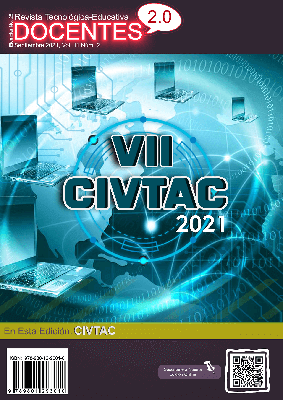Technological Skills: A New Pedagogical Model
 DOI:
https://doi.org/10.37843/rted.v11i2.246
DOI:
https://doi.org/10.37843/rted.v11i2.246
Main Article Content
Abstract
In the last decades of the previous century, a dizzying technological advance emerged in the world. The educational systems were not far from these advances; teaching from virtuality was a new challenge, which caused different projects for this purpose. Teaching performance in pedagogical practice requires a high level of preparation and knowledge on the part of the teacher, which is where the methodological and investigative work is reflected. The objective of this research was to implement a pedagogical model to improve teaching performance with a focus on technological competencies. A descriptive methodology was used for each of the four stages under a mixed approach. Of the 52 professors belonging to the University of Artemisa, 35 selected an intentional non-probabilistic sample. The consultation with specialists was carried out with seven teachers from the Rubén Martínez Villena Higher Pedagogical Institute, 5 of them with more than 25 years of experience at the higher level. The results achieved served as a starting point to characterize teaching performance, focusing on technological competencies, and measuring indicators. Subsequently, it provided teachers with the construction of their learning resources related to their identified competencies, technical context, and subject; this made the teaching process significant.
Downloads
Metrics
Article Details

This work is licensed under a Creative Commons Attribution-NonCommercial-NoDerivatives 4.0 International License.
Those authors who have publications in our journal accept the following terms:
- When a work is accepted for publication, the author retains rights of reproduction, distribution of his/her article for exploitation in all countries of the world in the format provided by our magazine and any other magnetic medium, optical, and digital.
- Authors will retain their copyright and guarantee the journal the right first to publish their work, which will be simultaneously subject to the Creative Commons Acknowledgment License (Attribution-NonCommercial-NoDerivatives 4.0 International (CC BY-NC-ND 4.0)). That allows third parties to copy and redistribute the material in any medium or format, under the following conditions: Acknowledgment - You must properly acknowledge authorship, provide a link to the license, and indicate if any changes have been made. You may do so in any reasonable way, but not in a way that suggests you have the licensor's endorsement or receive it for your use. NonCommercial - You may not use the material for a commercial purpose. NoDerivatives - If you remix, transform, or build from the material, you cannot broadcast the modified material. There are no additional restrictions - You cannot apply legal terms or technological measures that legally restrict you from doing what the license allows.
- Authors may adopt other non-exclusive license agreements to distribute the published version of the work (e.g., deposit it in an institutional archive or publish it in a monographic volume) provided that the initial publication in this journal is indicated.
- Authors are allowed and recommended to disseminate their work through the Internet (e.g., in institutional telematic archives, repositories, libraries, or their website), producing exciting exchanges and increasing the published work's citations.
- Request of withdrawal an article has to be done in writing by the author to the Editor, becoming effective after a written response from the Editor. For this purpose, the author or authors will send correspondence via e-mail: [email protected].
- The author will not receive financial compensation for the publication of his work.
- All Docentes 2.0 Journal publications are under the Open Journal System (OJS) platform at: https://ojs.docentes20.com/.
References
Adell, J. (1997). Tendencias en educación en la sociedad de las tecnologías de la información. EDUTEC, Revista Electrónica de Tecnología Educativa, 7.
Adell, J., & Castañeda, L. (2016). Los entornos personales de aprendizaje (PLEs): Una nueva manera de entender el aprendizaje. In R. Roig Vila & M. Fiorucci (Eds.), Claves para la investigación en innovación y calidad educativas. Alcoy: Marfil - Roma TRE Universita degli studi.
Alonso, M. Á., Martínez, V., Castillo, I., & Muñoz, Y. (2015). Desarrollando Competencias Digitales en los Docentes. Pistas Educativas, 112, 439–459. http://www.itcelaya.edu.mx/ojs/index.php/pistas/articl e/viewFile/390/378
Area, M., Gutiérrez, A., & Vidal, F. (2012). Alfabetización digital y competencias informacionales. Editorial Ariel.
Bisquerra, R. (2004). Metodología de la investigación educativa. La Muralla.
Buschman, J. (2014). Alfabetización informacional, «nuevas» alfabetizaciones y alfabetización. Boletín de la Asociación Andaluza de Bibliotecarios, 155-183.
Cabero, J., & Llorente, M. C. (2008). La Alfabetización Digital de los Alumnos. Competencias Digitales para el siglo XXI, 42(2), 7-28. DOI: https://doi.org/10.14195/1647-8614_42-2_1
Cano, E. (2017). Las competencias de los docentes. En A. López Hernández (Ed.), El desarrollo de competencias docentes en la formación del profesorado. Ministerio de Educación y Ciencia.
Carrera, F. X., & Coiduras, J. (2012). Identificación de la competencia digital del profesor universitario: Un estudio exploratorio en el ámbito de las ciencias sociales. Revista de Docencia Universitaria (REDU), 10(2), 273-298. DOI: https://doi.org/10.4995/redu.2012.6108
Enlaces. (2011). Competencias y estándares TIC para la profesión docente. Centro de Educación y Tecnología (Enlaces). Ministerio de Educación, Gobierno de Chile.
García, S. (2017). Alfabetización Digital Razón y Palabra, 21 (98), 66-8. http://www.redalyc.org/articulo.oa?id=199553113006
González-Criollo, J. (2018). Desempeño Docente, Facultad de Educación y Humanidades Programa Académico de Educación. Universidad Científica del Perú.
Hernández, R., Hernández, C. & Baptista P. (2010). Metodología de la Investigación. McGraw Hill.
Prendes, P., & Gutiérrez, I. (2013). Competencias tecnológicas del profesorado en las universidades españolas. Revista de Educación, (361), 196–222. https://doi.org/10.4438/1988- 592X-RE-2011-361-140
Vásquez, H.& Eugenia, L. (2013). Educación y modelos pedagógicos. Secretaría de Educación de Boyacá, Área Misional.
Valle-Lima, A. (2007). Metamodelos de la investigación pedagógica. Instituto central de ciencias pedagógicas. Ministerio de educación. Cuba.






